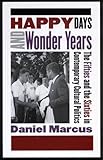Happy Days and Wonder Years : The Fifties and the Sixties in Contemporary Cultural Politics / Daniel Marcus.
Material type: TextPublisher: New Brunswick, NJ : Rutgers University Press, [2004]Copyright date: ©2004Description: 1 online resource (280 p.)Content type:
TextPublisher: New Brunswick, NJ : Rutgers University Press, [2004]Copyright date: ©2004Description: 1 online resource (280 p.)Content type: - 9780813533902
- 9780813542508
- Conservatism -- United States
- Conservatism -- United States
- Nineteen fifties
- Nineteen sixties
- Politics and culture -- United States
- Politics and culture -- United States -- History -- 20th century
- Politics and culture -- United States
- Popular culture -- History -- 20th century -- United States
- Popular culture -- United States -- History -- 20th century
- Popular culture -- United States
- SOCIAL SCIENCE / General
- 306/.0973/09045 22
- E839.5
- online - DeGruyter
| Item type | Current library | Call number | URL | Status | Notes | Barcode | |
|---|---|---|---|---|---|---|---|
 eBook
eBook
|
Biblioteca "Angelicum" Pont. Univ. S.Tommaso d'Aquino Nuvola online | online - DeGruyter (Browse shelf(Opens below)) | Online access | Not for loan (Accesso limitato) | Accesso per gli utenti autorizzati / Access for authorized users | (dgr)9780813542508 |
Browsing Biblioteca "Angelicum" Pont. Univ. S.Tommaso d'Aquino shelves, Shelving location: Nuvola online Close shelf browser (Hides shelf browser)

|

|

|

|

|

|

|
||
| online - DeGruyter Biology at Work : Rethinking Sexual Equality / | online - DeGruyter American Reform Judaism : An Introduction / | online - DeGruyter Global Currents : Media and Technology Now / | online - DeGruyter Happy Days and Wonder Years : The Fifties and the Sixties in Contemporary Cultural Politics / | online - DeGruyter Hearts of Darkness : White Women Write Race / | online - DeGruyter Ladies' Pages : African American Women's Magazines and the Culture That Made Them / | online - DeGruyter New Perspectives on Environmental Justice : Gender, Sexuality, and Activism / |
Frontmatter -- Contents -- Acknowledgments -- Introduction -- 1. The Fifties in the 1970s: Representations in a Cultural Revival -- 2. The Conservative Uses of Nostalgia -- 3. Nostalgia Embodied: Ronald Reagan as Icon -- 4. Popular Culture and the Response to Conservative Nostalgia -- 5. Contests and Contestations: The Sixties Legacy during the Decline of Reagan -- 6. The Reinflection of the Past: The Presidential Election of 1992 -- 7. Elvis Has Left the Building: The Resurgence of the Right -- Conclusion -- Notes -- Index -- About the Author
restricted access online access with authorization star
http://purl.org/coar/access_right/c_16ec
In the twenty-first century, why do we keep talking about the Fifties and the Sixties? The stark contrast between these decades, their concurrence with the childhood and youth of the baby boomers, and the emergence of television and rock and roll help to explain their symbolic power. In Happy Days and Wonder Years, Daniel Marcus reveals how interpretations of these decades have figured in the cultural politics of the United States since 1970. From Ronald Reagan's image as a Fifties Cold Warrior to Bill Clinton's fandom for Elvis Presley and John F. Kennedy, politicians have invoked the Fifties and the Sixties to connect to their public. Marcus shows how films, television, music, and memoirs have responded to the political nostalgia of today, and why our entertainment remains immersed in reruns, revivals, and references to earlier times. This book offers a new understanding of how politics and popular culture have influenced our notions of the past, and how events from long ago continue to shape our understanding of the present day.
Mode of access: Internet via World Wide Web.
In English.
Description based on online resource; title from PDF title page (publisher's Web site, viewed 27. Jan 2023)


